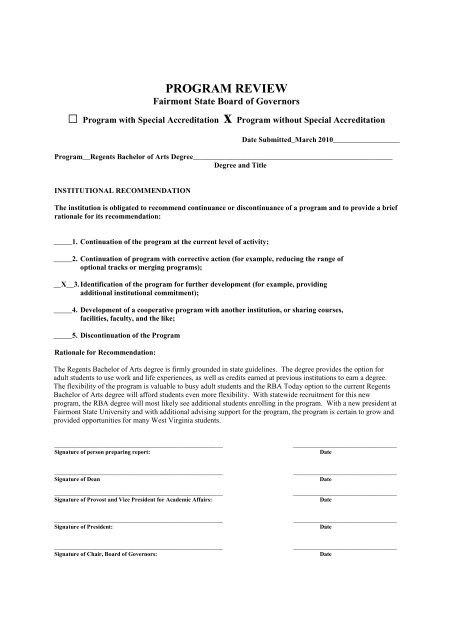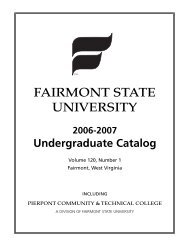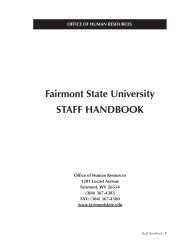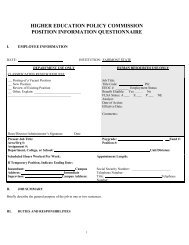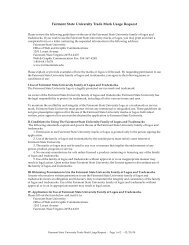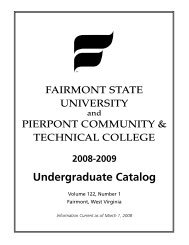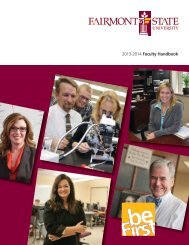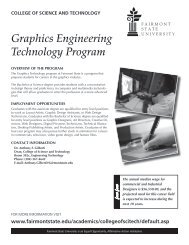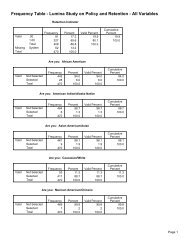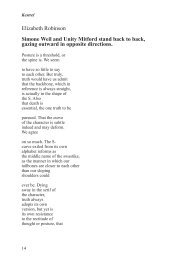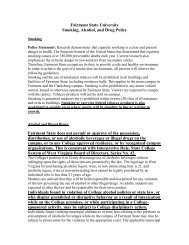Regents Bachelor of Arts Degree - Fairmont State University
Regents Bachelor of Arts Degree - Fairmont State University
Regents Bachelor of Arts Degree - Fairmont State University
Create successful ePaper yourself
Turn your PDF publications into a flip-book with our unique Google optimized e-Paper software.
PROGRAM REVIEW<br />
<strong>Fairmont</strong> <strong>State</strong> Board <strong>of</strong> Governors<br />
□Program with Special Accreditation x Program without Special Accreditation<br />
Date Submitted_March 2010__________________<br />
Program__<strong>Regents</strong> <strong>Bachelor</strong> <strong>of</strong> <strong>Arts</strong> <strong>Degree</strong>______________________________________________________<br />
<strong>Degree</strong> and Title<br />
INSTITUTIONAL RECOMMENDATION<br />
The institution is obligated to recommend continuance or discontinuance <strong>of</strong> a program and to provide a brief<br />
rationale for its recommendation:<br />
_____1. Continuation <strong>of</strong> the program at the current level <strong>of</strong> activity;<br />
_____2. Continuation <strong>of</strong> program with corrective action (for example, reducing the range <strong>of</strong><br />
optional tracks or merging programs);<br />
__X__3.Identification <strong>of</strong> the program for further development (for example, providing<br />
additional institutional commitment);<br />
_____4. Development <strong>of</strong> a cooperative program with another institution, or sharing courses,<br />
facilities, faculty, and the like;<br />
_____5. Discontinuation <strong>of</strong> the Program<br />
Rationale for Recommendation:<br />
The <strong>Regents</strong> <strong>Bachelor</strong> <strong>of</strong> <strong>Arts</strong> degree is firmly grounded in state guidelines. The degree provides the option for<br />
adult students to use work and life experiences, as well as credits earned at previous institutions to earn a degree.<br />
The flexibility <strong>of</strong> the program is valuable to busy adult students and the RBA Today option to the current <strong>Regents</strong><br />
<strong>Bachelor</strong> <strong>of</strong> <strong>Arts</strong> degree will afford students even more flexibility. With statewide recruitment for this new<br />
program, the RBA degree will most likely see additional students enrolling in the program. With a new president at<br />
<strong>Fairmont</strong> <strong>State</strong> <strong>University</strong> and with additional advising support for the program, the program is certain to grow and<br />
provided opportunities for many West Virginia students.<br />
_________________________________________________________<br />
Signature <strong>of</strong> person preparing report:<br />
___________________________________<br />
Date<br />
_________________________________________________________<br />
Signature <strong>of</strong> Dean<br />
_________________________________________________________<br />
Signature <strong>of</strong> Provost and Vice President for Academic Affairs:<br />
___________________________________<br />
Date<br />
___________________________________<br />
Date<br />
_________________________________________________________<br />
Signature <strong>of</strong> President:<br />
___________________________________<br />
Date<br />
_________________________________________________________<br />
Signature <strong>of</strong> Chair, Board <strong>of</strong> Governors:<br />
___________________________________<br />
Date
Executive Summary for Program Review<br />
Name and degree level <strong>of</strong> program<br />
<strong>Regents</strong> <strong>Bachelor</strong> <strong>of</strong> <strong>Arts</strong> degree<br />
External reviewer(s)<br />
Program Advisory Committee consists <strong>of</strong> School Deans and Academic Chairs as they comprise<br />
the Academic Affairs Council. An annual report on the RBA program is submitted to the<br />
Council and discussions <strong>of</strong> any concerns takes place there. Open communication between<br />
Deans, Chairs, Coordinators, and the RBA advisor is encouraged and conducted as needed. On a<br />
larger level, the RBA Program at <strong>Fairmont</strong> <strong>State</strong> <strong>University</strong> receives statewide support from the<br />
other state RBA coordinators. This group meets with the <strong>State</strong> RBA Coordinator who monitors<br />
the program at the Higher Education Board Office.<br />
Synopses <strong>of</strong> significant findings, including findings <strong>of</strong> external reviewer(s)<br />
<strong>Fairmont</strong> <strong>State</strong> <strong>University</strong> needs to identify a coordinator for the degree program and provide<br />
more consistency with the degree. Currently, one advisor meets with students; however, a<br />
coordinator needs to be identified so that there may be more recruitment for this program.<br />
Plans for program improvement, including timeline<br />
<strong>Fairmont</strong> <strong>State</strong> <strong>University</strong> will be participating in the RBA Today program that is scheduled to<br />
begin fall 2010 and will increase the number <strong>of</strong> advisors who work with the program.<br />
RBA Today is an enhanced version <strong>of</strong> the <strong>Regents</strong> <strong>Bachelor</strong> <strong>of</strong> <strong>Arts</strong> degree that for<br />
many years has provided baccalaureate degree opportunities to working adults who<br />
want to improve their skills, advance in their careers, or reach the goal <strong>of</strong> achieving a<br />
degree without putting their lives on hold. The format <strong>of</strong> the RBA Today continues the<br />
underlying elements <strong>of</strong> the <strong>Regents</strong> <strong>Bachelor</strong> <strong>of</strong> <strong>Arts</strong>, but adds new curricular areas <strong>of</strong><br />
emphasis and allows participants the flexibility <strong>of</strong> online learning and Fast Track<br />
courses.<br />
Identification <strong>of</strong> weaknesses or deficiencies from the previous review and the status <strong>of</strong><br />
improvements implemented or accomplished<br />
Weaknesses identified from the last review included the lack <strong>of</strong> personnel and the lack <strong>of</strong><br />
adequate space. The RBA program is being moved into the Academic Advising Center and will<br />
have additional personnel to assist with RBA students; a new director will be appointed.
Five-year trend data on graduates and majors enrolled<br />
<strong>Regents</strong><br />
<strong>Bachelor</strong><br />
<strong>of</strong> <strong>Arts</strong><br />
Fall<br />
2003<br />
Fall<br />
2004<br />
Fall<br />
2005<br />
Fall<br />
2006<br />
Fall<br />
2007<br />
Fall<br />
2008<br />
Fall<br />
2009<br />
Total<br />
Majors 82 73 76 57 66 57 68 479<br />
Graduates 68 51 42 60 45 43 38 347<br />
Summary <strong>of</strong> assessment model and how results are used for program improvement<br />
Outcomes and assessments have been identified for all courses at <strong>Fairmont</strong> <strong>State</strong> <strong>University</strong>.<br />
Since the <strong>Regents</strong> <strong>Bachelor</strong> <strong>of</strong> <strong>Arts</strong> degree uses courses from other programs, the course<br />
outcomes and assessments will fall under those guidelines. All <strong>of</strong> this information is housed in<br />
TaskStream and is available for all courses.<br />
Data on student placement (for example, number <strong>of</strong> students employed in positions related to the<br />
field <strong>of</strong> study or pursuing advanced degrees)<br />
From the“Graduate Folow Up” surveys:<br />
1] Good mix <strong>of</strong> male and females, predominantly white, non-hispanic… generaly in the 35-50<br />
age ranges, otherwise late 20-s.<br />
2] The “Reflecting back on overal education experience … “ item gives me some real concern<br />
with the number <strong>of</strong> unsatisfactory and very unsatisfactory, but the limited to FSU / benefits<br />
seems to show some positives.<br />
3] Salaries are expected for WV and higher than the relative per capita.<br />
4] Employment is a mix <strong>of</strong> public/private/educational sectors … mostly al in WV<br />
5] Very mixed on current job satisfaction and longer range opportunities<br />
6] A few indicate graduate work/studies.<br />
Final recommendations approved by governing board<br />
Identification <strong>of</strong> the program for further development
PROGRAM REVIEW<br />
FAIRMONT STATE UNIVERSITY OR PIERPONT COMMUNITY AND TECHNICAL COLLEGE<br />
Program:<br />
School:<br />
<strong>Regents</strong> <strong>Bachelor</strong> <strong>of</strong> <strong>Arts</strong> <strong>Degree</strong><br />
Academic Affairs<br />
Date: March 2010<br />
Program Catalog Description:<br />
The <strong>Regents</strong> <strong>Bachelor</strong> <strong>of</strong> <strong>Arts</strong> <strong>Degree</strong> Program (RBA) is designed to <strong>of</strong>fer adult students the<br />
opportunity to complete a bachelor’s degree with flexibility. This degree presents an<br />
opportunity to recognize a student’s maturity as wel as the unique demands <strong>of</strong> work and<br />
family commitments. The program <strong>of</strong>fers students the opportunity to fully utilize previous<br />
college credits, military experiences, and work related and life learning experiences. This<br />
nontraditional degree is open to adults who are at least four years past high school graduation;<br />
in addition, the degree targets those who have completed from one to three years <strong>of</strong> study in an<br />
accredited college or university, but who have not yet finished a baccalaureate degree.<br />
The RBA <strong>Degree</strong> Program parallels the level <strong>of</strong> academic quality seen in more traditional<br />
bachelor degree programs. The program is not intended for students excluded from other<br />
academic programs for reasons <strong>of</strong> poor academic quality. The integrity and viability <strong>of</strong> the<br />
RBA <strong>Degree</strong> Program is <strong>of</strong> critical importance. The policies and guidelines, credit awards,<br />
and requirements are subject to review and revision at least twice a year during the statewide<br />
Coordinators’ Meetings. Special subcommitees are appointed yearly to review and reaccredit<br />
existing awards and programs.<br />
The RBA <strong>Degree</strong> can be individualy tailored for those students who need a bachelor’s degree<br />
to re-enter the work force; those preparing for career advancement; those who have an<br />
associate degree for which there is no corresponding baccalaureate degree available to them;<br />
those who wish to pursue graduate school; or those who seek intellectual development and<br />
personal fulfillment. Many students identify themselves with at least two or three <strong>of</strong> these<br />
needs and goals.
VIABILITY (§ 4.1.3.1)<br />
Enrollments<br />
<strong>Regents</strong><br />
<strong>Bachelor</strong><br />
<strong>of</strong> <strong>Arts</strong><br />
Fall<br />
2003<br />
Fall<br />
2004<br />
Fall<br />
2005<br />
Fall<br />
2006<br />
Fall<br />
2007<br />
Fall<br />
2008<br />
Fall<br />
2009<br />
Total<br />
Majors 82 73 76 57 66 57 68 479<br />
Graduates 68 51 42 60 45 43 38 347<br />
Liberal Studies Requirements Met<br />
Students must complete 128 semester hours comprised <strong>of</strong> 36<br />
general education hours (communications, humanities, natural sciences, social<br />
sciences, mathematics or computer applications), 40 upper division hours, and 52<br />
elective hours. Another option allows for an area <strong>of</strong> emphasis in institutionally<br />
sanctioned program areas <strong>of</strong> study with the completion <strong>of</strong> a minimum <strong>of</strong> 15 hours <strong>of</strong><br />
upper division, graded coursework, with a minimum grade <strong>of</strong> “C” in each clas.<br />
Communications–6 hours<br />
Social Sciences–6 hours<br />
Natural Sciences–6 hours<br />
Humanities–6 hours<br />
Mathematical Sciences or Computer Applications–3 hours<br />
Other–9 hours<br />
Assessment Requirements
Since the RBA Program does not have a designated major or minor, there is much flexibility<br />
and variety <strong>of</strong> course selection that a standard means <strong>of</strong> academic assessment that might be<br />
used in other degree programs cannot be applied. Students are assessed upon application to the<br />
RBA Program and apprised <strong>of</strong> any special requirements that must be met. Course placement<br />
testing is conducted in writing, math. If needed, developmental course work is completed.<br />
Designing an individualized program <strong>of</strong> study for an RBA student is part <strong>of</strong> the educational<br />
goal. Assessment <strong>of</strong> the quality <strong>of</strong> the design and its fit to the student is realized when the<br />
student is successful in its completion. Students may take as long as they need to complete<br />
their study; only those files which show no activity for more than five years are removed.<br />
Students <strong>of</strong>ten return to college with out-<strong>of</strong>-date courses. They are individually<br />
assessed and advised to audit or repeat those courses with technical or retention<br />
sensitive elements, such as math, computer applications, accounting principles, foreign<br />
languages, in order that they may successfully move toward graduation and have solid<br />
prerequisite knowledge for upper level course work. These recommendations are reassessed<br />
and recorded in the student file at midterm and at the end <strong>of</strong> the semester.<br />
Completion <strong>of</strong> the 36 hours required for general education requirements and the 40<br />
hours <strong>of</strong> upper level course work required indicates mastery <strong>of</strong> essential skills. For<br />
those students who retain or initiate a new are <strong>of</strong> study, clearly their achievement in<br />
that “major” cluster <strong>of</strong> clases demonstrates mastery. The ongoing one-on-one<br />
advising opportunities for RBA students with the advisor favorably impact the<br />
outcomes for students and the program.<br />
A program worksheet is kept in each student’s academic folder. Academic monitoring<br />
<strong>of</strong> satisfactory progress is notes, emails or memos to the student retained, and<br />
agreements or suggestions about portfolio work included in the records. This file is<br />
reviewed before scheduling <strong>of</strong> classes and after each semester <strong>of</strong> course work is<br />
completed. It is updated prior to any advising session that occurs in person or by email<br />
or phoned. A graduation audit is conducted two semesters prior to graduation and<br />
directly following graduation to ensure requirements are met and the degree is earned.<br />
Program quality and integrity are assessed through initial portfolio review conducted<br />
by the faculty advisor. Good communication between Deans, Chairs, and the RBA<br />
advisor helps to strengthen the expectations and the outcomes <strong>of</strong> the student portfolio<br />
efforts. Over the past several years, the number <strong>of</strong> portfolio submissions for credit has<br />
diminished. However, more rigorous standards and guidelines have been set. Personal<br />
advising sessions on portfolio construction and a careful selection <strong>of</strong> courses to<br />
challenge are now being required. Fewer portfolios are returned without some credit<br />
awarded as a result <strong>of</strong> these quality controls.<br />
In-state RBA Coordinator meetings occur twice a year at which time program concerns<br />
and issues are addressed. Established standard credit awards (CEC) are reviewed and<br />
revised as needed or as scheduled. Meeting agendas focus on program quality and<br />
integrity; transfer issues, institutional policies that impact the RBA Programs,<br />
prospective CEC awards under review. Subcommittees are formed as needed to<br />
address any large scale issues that will need recommendation for action to the state<br />
Higher Education Policy Commission (HEPC).<br />
The RBA Today program has initiated much discussion about the <strong>Regents</strong> <strong>Bachelor</strong> <strong>of</strong><br />
<strong>Arts</strong> degree during the past year. This has given institutions across the state the<br />
opportunity to evaluate their individual RBA programs..
Adjunct use<br />
The RBA Programs does not have specified faculty. The degree utilized courses taught<br />
throughout all the curricula <strong>of</strong>fered by <strong>Fairmont</strong> <strong>State</strong> <strong>University</strong>; in the West Virginia <strong>State</strong><br />
Universities and Colleges; and in other accredited institutions <strong>of</strong> higher learning throughout the<br />
country. Students in this degree program have access to full time, part time, and adjunct<br />
faculty employed by <strong>Fairmont</strong> <strong>State</strong> <strong>University</strong> and Pierpont Community & Technical College.<br />
Graduation/Retention Rates<br />
<strong>Regents</strong><br />
<strong>Bachelor</strong><br />
<strong>of</strong> <strong>Arts</strong><br />
Fall<br />
2003<br />
Fall<br />
2004<br />
Fall<br />
2005<br />
Fall<br />
2006<br />
Fall<br />
2007<br />
Fall<br />
2008<br />
Fall<br />
2009<br />
Total<br />
Graduates 68 51 42 60 45 43 38 347
Retention Calculations for RBA<br />
First-time Students<br />
Cohort Size <strong>of</strong><br />
RBA First-time<br />
Freshmen<br />
Count <strong>of</strong> this<br />
Fall Cohort<br />
Retained until<br />
Next Fall IN the<br />
RBA Program<br />
Count <strong>of</strong> this<br />
Fall Cohort<br />
Retained until<br />
Next Fall at FSU<br />
PCTC Retention<br />
<strong>of</strong> RBA FT<br />
Cohort<br />
RBA FT Program<br />
Fall<br />
Retention Rate<br />
2003 1 0 0.00% 0 0.00%<br />
2004 2 1 50.00% 1 50.00%<br />
2005 3 1 33.33% 1 33.33%<br />
2006 0 0 N/A 0 N/A<br />
2007 0 0 N/A 0 N/A<br />
2008 0 0 N/A 0 N/A<br />
6-Yr Mean 1.00 0.33 27.78% 0.33 27.78%<br />
Next<br />
Retention Calculations for RBA<br />
Transfer-In Students<br />
Cohort Size <strong>of</strong><br />
RBA Transfer-In<br />
Student<br />
Count <strong>of</strong> this<br />
Fall Cohort<br />
Retained until<br />
Next Fall IN the<br />
RBA Program<br />
Count <strong>of</strong> this<br />
Fall Cohort<br />
Retained until<br />
Next Fall at FSU<br />
PCTC Retention<br />
<strong>of</strong> RBA Transfer-<br />
In Cohort<br />
RBA Transfer-In<br />
Fall<br />
Retention Rate<br />
2003 9 4 44.44% 4 44.44%<br />
2004 0 0 N/A 0 N/A<br />
2005 12 4 33.33% 5 41.67%<br />
2006 4 3 75.00% 3 75.00%<br />
2007 11 3 27.27% 5 45.45%<br />
2008 8 3 37.50% 4 50.00%<br />
6-Yr Mean 7.33 2.83 43.51% 3.50 51.31%<br />
Next<br />
Previous Program Review Results<br />
Recommended to continue at the current level.
ADEQUACY (§ 4.2.4.2)<br />
Program Requirements:<br />
Liberal Studies 32-42 __36 hrs 6 hours <strong>of</strong> communication<br />
6 hours <strong>of</strong> social science<br />
6 hours <strong>of</strong> natural science<br />
3 hours <strong>of</strong> math and/or computer science<br />
6 hours <strong>of</strong> humanities<br />
Major 32-65 ____hrs Although specific Areas <strong>of</strong> Emphasis are not<br />
required in the <strong>Fairmont</strong> <strong>State</strong> <strong>University</strong> RBA<br />
program, students’ individualized programs <strong>of</strong> study<br />
<strong>of</strong>ten reflect at least one area <strong>of</strong> focus. Students are<br />
encouraged to work toward knowledge and skills<br />
that will enhance existing careers, prepare them for<br />
changing career fields, or facilitate entrance into<br />
graduate programs.<br />
Electives min 21 ____hrs A total <strong>of</strong> 40 hours <strong>of</strong> upper division hours are<br />
required.<br />
TOTAL max 128 _128 hrs<br />
Programs not meeting the above requirements must request a continuation <strong>of</strong> their exception<br />
with a justification below:<br />
Faculty Data<br />
The RBA Programs does not have specified faculty. The degree utilized courses taught<br />
throughout all the curricula <strong>of</strong>fered by <strong>Fairmont</strong> <strong>State</strong> <strong>University</strong>; in the West Virginia <strong>State</strong><br />
Universities and Colleges; and in other accredited institutions <strong>of</strong> higher learning throughout the<br />
country. Students in this degree program have access to full time, part time, and adjunct<br />
faculty employed by <strong>Fairmont</strong> <strong>State</strong> <strong>University</strong> and Pierpont Community & Technical College.<br />
The role <strong>of</strong> faculty portfolio evaluator is open to assignment by the School Deans, Chairs or<br />
coordinators. All faculty members have access to <strong>Fairmont</strong> <strong>State</strong> faculty development<br />
programs, faculty evaluation procedures, and faculty merit review.
Accreditation/national standards<br />
The <strong>Fairmont</strong> <strong>State</strong> <strong>University</strong> RBA program meets the standards set by the state RBA <strong>Degree</strong><br />
Program.<br />
Entrance Standards<br />
Students enrolled in the RBA Program must meet the same admissions standards as all<br />
students admitted to <strong>Fairmont</strong> <strong>State</strong> <strong>University</strong>. Also;<br />
Applicants must have been graduated from high school four years or more prior to<br />
enrollment in the program.<br />
If applicants possess a GED, they must be four years past the time their high school<br />
class graduated.<br />
Readmits and transfers applying to the RBA must be four years past high school<br />
graduation and/or eligible to return to their prior transfer institution.<br />
Applicants to the RBA cannot have earned a previous baccalaureate degree.<br />
After admission to the RBA program, students are subject to the academic<br />
requirements <strong>of</strong> the RBA degree and to the general grading practices as outlined in the<br />
<strong>University</strong> catalog.
NECESSITY (§ 4.1.3.3)<br />
Were existing campus-based options viable, more adults would be engaged and would have<br />
already re-enrolled. Fortunately, West Virginia has a degree option that is targeted to adult<br />
students - the <strong>Regents</strong> <strong>Bachelor</strong> <strong>of</strong> <strong>Arts</strong> (RBA). During the last 10 years, nearly 8,000 West<br />
Virginians have received the RBA degree - the most productive in terms <strong>of</strong> numbers <strong>of</strong><br />
graduates in the state. By combining the Adult Learner initiative with the <strong>Regents</strong> <strong>Bachelor</strong> <strong>of</strong><br />
<strong>Arts</strong>, returning students will find a convenient and adult-friendly degree model for pursuing<br />
their education. To that end, West Virginia, through its public colleges and universities, is<br />
initiating a new, flexible and affordable baccalaureate degree completion program that<br />
will provide working-age adults wishing to return to college the opportunity to earn a<br />
bachelor’s degree. The initiative, targeted to adults who have some colege experience<br />
but have never completed a degree, will provide new pathways to a degree, will utilize<br />
alternative delivery methods, compressed learning periods and adult-focused services.
CONSISTENCY WITH MISSION (§ 4.1.3.4)<br />
The <strong>Regents</strong> <strong>Bachelor</strong> <strong>of</strong> <strong>Arts</strong> <strong>Degree</strong> is a program that is consistent with the mission <strong>of</strong><br />
<strong>Fairmont</strong> <strong>State</strong> <strong>University</strong>. The reasons adult students return to college vary, but whatever the<br />
reason, returning to college is a smart move. Some seek to develop workplace skills,<br />
others want pr<strong>of</strong>essional growth, and some just want to complete a college degree and<br />
realize a dream that started 10, 20, 30 or even 40 years ago. They may have<br />
experienced a life-changing event, such as marriage, divorce, or relocation, dropped out<br />
<strong>of</strong> college for financial reasons, or departed for academic reasons. But they all realize<br />
that geting a colege degree changes a person’s life and can open the way to many<br />
new opportunities. In fact, college graduates will earn about $1 million more than high<br />
school graduates during their lifetimes. And earning a college degree will bring other<br />
benefits, including:<br />
Boosting new job prospects<br />
Enhancing better opportunities for promotions<br />
Developing an expanded knowledge base and new perspective for work and life<br />
Opening doors to further advanced education following completion <strong>of</strong> a degree<br />
Influencing college and career decisions <strong>of</strong> family, friends, and co-workers<br />
Attainment <strong>of</strong> abachelor’s degree wil give each returning student a competitive<br />
advantage in the market place and provide the necessary skills and knowledge valued by<br />
employers in business, government, and organizations.<br />
Signatures and Recommendations<br />
The required sheet with signatures and recommendation should be used as a cover sheet.


